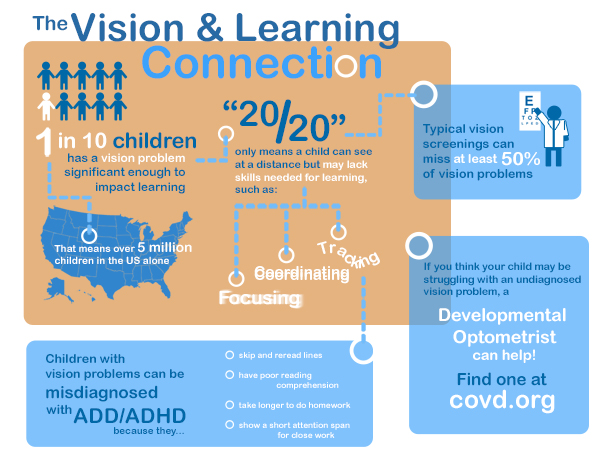
Behavioural problems?
Learning Difficulty?
Or could it be an visual skill problem?
Did you know?
Seeing 20/20 or 6/6 is a pass for a general eye screening, but it may not indicate a child has good visual skills for learning to potential. In addition to seeing clearly for far, good visual acuity for Near, together with good eye tracking, eye teaming, focusing and good visual perception are all necessary skills for a effective learner.
Deficits in some of these skills can manifest as behavioural changes which may be a cause for a ADHD/ADD diagnosis as the child develops.
Why didn't your child tell you?
A child assumes that he sees the same as everyone else does. Poor tracking (skip words/lines) during reading can be mistaken carelessness. Look at the video in this page and observe how difficult it is for the child to perform eye tracking.
As a result, the child will be deemed to be "slower" compared to their peers and may start to develop inferiority complex, and begin making behavioural changes, such as forming a dislike for reading, poor sustained attention for near tasks, lacks attention or focus, bored with academia which are similar to ADHD signs and symptoms.
According to the American Optometric Association, up to 80% of learning in a school setting is done through the eyes!
Please fill this form and get a complimentary short consultation at our office.
A great book to read :
The Hidden Link Between Vision and Learning: Why Millions of Learning-Disabled Children Are Misdiagnosed
Seeing 20/20 or 6/6 is a pass for a general eye screening, but it may not indicate a child has good visual skills for learning to potential. In addition to seeing clearly for far, good visual acuity for Near, together with good eye tracking, eye teaming, focusing and good visual perception are all necessary skills for a effective learner.
Deficits in some of these skills can manifest as behavioural changes which may be a cause for a ADHD/ADD diagnosis as the child develops.
Why didn't your child tell you?
A child assumes that he sees the same as everyone else does. Poor tracking (skip words/lines) during reading can be mistaken carelessness. Look at the video in this page and observe how difficult it is for the child to perform eye tracking.
As a result, the child will be deemed to be "slower" compared to their peers and may start to develop inferiority complex, and begin making behavioural changes, such as forming a dislike for reading, poor sustained attention for near tasks, lacks attention or focus, bored with academia which are similar to ADHD signs and symptoms.
According to the American Optometric Association, up to 80% of learning in a school setting is done through the eyes!
Please fill this form and get a complimentary short consultation at our office.
A great book to read :
The Hidden Link Between Vision and Learning: Why Millions of Learning-Disabled Children Are Misdiagnosed

